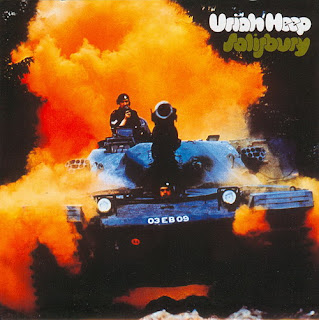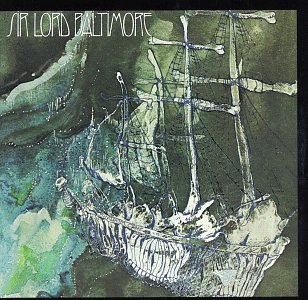Progressive Rock is a genre that has got a bad rep over the years, and it's not hard to see why. Overblown and overlong, the worst prog rock resides at the absolute bottom of the bad music barrel, sitting alongside hotel lobby muzak as some of the most excruciatingly painful sounds ever to be commited to vinyl. However when prog is done right, it can be some of the best, most experimental and adventurous music out there. It's a diverse genre whose one common feature is the desire to push boundaries and create something new, different and thought provoking. Here (in no particular order) are some of the best examples of what this genre has to offer, at least in my own opinion.
1. Emerson, Lake and Palmer - Tarkus
A band once described by John Peel as "A complete waste of time, talent and electricity", Emerson, Lake and Palmer (or ELP as they are often known) came to represent all of the worst excesses of Progressive rock. Self indulgent compositions, pretentious lyrics, grotesquely bloated stage productions, and egos so huge that they needed a truck
each just to transport them from one venue to another. But before ELP dissipated into the deepest recesses of self indulgence and vanity, it can't be denied that they made some bloody good records, and this is the final installment before they disappeared over the precipice of all that is pure progressive wank. Guitars wail, Hammond organs blare, synthesizers scream like air raid sirens, and this album just rocks. The first 20 minute self titled song is clearly the highlight, after which the album swings between swaggering blues rock, twee pop passages and jazzy intervals. It may be pure style over substance, but by God what style. TARKUS!!!
See also;
Emerson, Lake and Palmer - S/T
2.Rush - 2112
In the year 1976, Canuck Led Zeppelin wannabes Rush decided to trade in their perms and flares for some synthesizers and pulp sci-fi novels. The result is a barnstorming sci-fi concept album that details the story of a dystopian society threatened by the rediscovery of the power of music. Because as we all know, "the man" can't stand against the power of rock and roll. Like,
totally man! The resulting Led Zep influence meeting up with sci-fi concepts leads to a hard-rock prog album that melds heavy riffing with some truly inspirational lyrics. Songs that manage to make monks tending great supercomputers on a isolated asteroid sound both grand and sinister demand the attention of even the most jaded sci fi fans. As with the previous entry the real star of the show is the epic opening track, and the rest is fairly standard rock-fare.
See also- Everything rush did before 1982.
3. Yes - Fragile
Like messrs Emmerson, Lake and Palmer, Yes also unfortunately came to represent some of the worst aspects of prog rock, including aimless, meandering and patience testing tripe. But before those dark times when unpretentious punk put a much needed shotgun shell into the back Old Yellers drooling rabid head, there was
Roundabout.
Long distance Runaround.
South side of the sky. John Anderson's vocals are wonderfully expressive and heartfelt, and the whole thing feels incredibly earnest and sincere, worlds away from the pretentiousness that prog's critics often level at such bands. A stunning effort in terms of musical composition and pure feeling, Yes have an endearing optimism and naivete that only rarely gives way to musical indulgence. A classic.
See Also;
Yes, The Yes Album
4. Jethro Tull - Thick as a Brick
Ian Anderson can play a mean flute. Apparently he picked up the instrument after seeing Eric Clapton play the guitar, and decided he couldn't compete. And it's just as well he did, because it gave Jethro Tull a unique sound which is at its most refined here, and Ian Anderson's acerbic wit is especially sharp on
Thick as a Brick. Essentially a parody of concept albums, the lyrics are supposedly taken from an epic poem written by an 8 year old child prodigy named Gerald Bostock. Of course Bostock was a character creation of flutist and songwriter Anderson. But that didn't prevent him from giving the fictional Bostock joint songwriting credit on the album, a prank which still fools unsuspecting music fans to this day. Thick as a Brick is complex, compelling, funny, and with a sense of irony that often is missing from today's music.
See Also-
Aqualung
Van Der Graaf Generator - The Least We Can Do Is Wave to Each Other
Named after the invention of scientist Robert J. Van de Graaff, and despite getting his name wrong these Mancunian rockers definitely live up to the name. Angry sounding Saxophones and dreamy synths abound here. Resolutely uncompromising in their music, VDGG are one of the more overlooked bands of the genre, possibly because the hippy dippy types loathed their extreme mood swings between calmness and savageness. Unlike the gentler stylings of other prog contemporaries, VDGG swing violently between wistful melancholy to violent aggression. Only King Crimson could turn on a sixpence with greater speed, and this violence is reflected in some of the darker themes, such as the Spanish inquisition. This pessimism is tempered by a kind of stoic good naturedness. As the title quote says, "We're all awash in a sea of blood, and the least we can do is wave to each other."
See Also;
Pawn Hearts, Godbluff
6. Yonin Bayashi - Isshoku Sokuhatsu
Japanese musicians living in a strange hippie commune, Yonin Bayashi were reluctant to release music at all, presumably content to simply drink tea and play to their own cadre of counter culture dropouts. Thank your stars that they did, because Isshoku Sokuhatsu is a masterpiece. Heavily influenced by Pink Floyd and the psychedelic rock of the day, Yonin Bayashi took those influences and did what the Japanese do best- combine them with an almost unhealthy level of virtuosity to produce a record that is absolutely stunning. Unknown by most prog rock fans, this album is a hidden treasure from the east that shines as brightly as any well known classic.
See Also;
Osamu Kitajima - Benzaiten
7. Hawkwind - Space Ritual
Hawkwind are more of a phenomenon than a true band. A force of nature, coming out of a loose affiliation of 60's counter culture musicians and artists to blare stoner riffs and synth wails at you while reciting weird spoken word poetry, only for you to realize that the walls are melting and you've been spiked with LSD. They mutated time and time again into many different forms, however this album represents Hawkwind's heyday as space rock legends. Although they produced many fantastic albums, the true Hawkwind experience was in the frenetic energy of their live performances, and no album captures that better than
Space Ritual. Lemmy is here with his chugging basslines, launching spaceship Hawkwind into orbit, so they can spin tales of psychic warfare, sonic attacks and the infinite blackness of the void.
See also;
X in Search of Space, Doremi Fasol Latido, Warrior On The Edge Of Time
8. Popol Vuh - Hosianna Mantra
Popul Vuh's greatest claim to fame is that composed the sountrack to Werner Herzog's film, "Aguirre, The Wrath Of God", but that haunting and austere soundtrack is not as consistent and memorable as Hosianna Mantra. Not rightly a "rock" album at all, but combining progressive sounds with elements of world music and classical composition. As the name suggests is heavily influenced by spiritual and religious music, but it owes as much to Tibetan and Indian music as it does to Gregorian chants and church hymns. Magical music to cheer even the darkest of moods, even an atheist can't deny the uplifting spiritual quality of these compositions.
9. Pink Floyd - The Dark Side Of The Moon
Okay, we all knew we'd end up here eventually. Scarcely a conversation about progressive rock can finish without at least a mention of the legendary Floyd, standing like a behemoth above all other bands. And of course the album had to be Dark Side. Floyd had many other great albums, but none have the breadth, scope, consistency and bite of
Dark Side.
Meddle and
Wish You Were Here come close, but lack its singular vision. And if anyone tells you
The Wall is their greatest, you have my permission to kick them sqarely in the groinal area for being such a conceited wank. Concepts such as the the ever inevitable march towards death, the endless persuit of material wealth, and madness and mental decay are discussed here. Even bringing these subjects up in music will lead some music fans to accuse the songwriter of pretentiousness, but the music so perfectly complements the subject matter that such accusations dissolve away. The weight of the subjects is completely deserved and justified, and this album is one of those rare life affirming musical experiences that comes along so rarely that it should always be cherished and remembered. Overrated? Not on your life.
See Also:
Wish You Were Here,
Animals, Meddle, Piper At The Gates Of Dawn
10. King Crimson - In The Court Of The Crimson King
Well, now i'm really in trouble. Just how in the hell do I even talk about this album, or the band it came from? Nothing about them is normal. Strange, atonal chords, complex compositions and weird time signatures abound.
In The Court Of The Crimson King is strange, savage, dreamlike, but always focused and never dull. Influenced by Jazz, modernist classical music and folk, the breadth of influences is to be expected for a band of this calibur, but the execution is something altogether different from the source and defies rigid categorization. Like the song
20th Century Schizoid Man, it
seems to capture the horror of the modern age, swinging from serenity to chaos and violence with shocking speed. To this day, no one sounds like King Crimson, and no one ever will.
See also;
In The Wake of Poseidon, Red, Starless and Bible Black, Discipline













.jpg)












